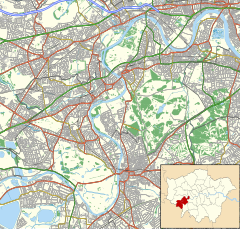Ham House
| Ham House | |
|---|---|

Ham House in 2007, with Coade stone statue of Father Thames, by John Bacon the elder, in the foreground
|
|
| General information | |
| Architectural style | Stuart |
| Town or city | Ham, London |
| Country | England |
| Coordinates | 51°26′37″N 0°18′59″W / 51.44361°N 0.31639°W |
| Completed | 1610 |
| Client | Sir Thomas Vavasour |
| Owner | National Trust |
| Design and construction | |
| Architect | Robert Smythson |
| Other information | |
| Parking | Ham Street |
| Website | |
| www |
|
|
Listed Building – Grade I
|
|
| Designated | 10 January 1950 |
| Reference no. | 1080832 |
Ham House is a historic house, situated beside the River Thames in Ham, south of Richmond in London. It is claimed by the National Trust to be "unique in Europe as the most complete survival of 17th century fashion and power." The house itself is designated by Historic England as a Grade I listed building. Its park and gardens are listed at Grade II* by Historic England in the Register of Historic Parks and Gardens of special historic interest in England.
Ham in the early 17th century was bestowed by James I on his son, Henry Frederick, Prince of Wales.
The house was built in 1610 by Sir Thomas Vavasour, Knight Marshal to James I. It originally comprised an H-plan layout consisting of nine bays and three storeys. The Thames-side location was ideal for Vavasour, allowing him to move between the courts at Richmond, London and Windsor. Prince Henry died in 1612, and the lands at Ham and Petersham passed to James' second son, Charles, several years prior to his coronation in 1625. After Vavasour's death in 1620, the house was granted to John Ramsay, 1st Earl of Holderness until his death in 1626.
In 1626 Ham House was leased to William Murray, whipping boy and close childhood friend of Charles I. Murray's initial lease was for 39 years and, in 1631, a further 14 years added but this did not give long term security of tenure for Murray's family. When George Cole had to sell his property in Petersham as part of the enclosure of Richmond Park in 1637, he made over the remaining leases of the Manors of Ham and Petersham to Murray. Murray sought to obtain the freehold but both this and a further bid in 1641 were unsuccessful. The neighbouring Manor of Canbury (Kingston) was also granted to William in 1640, but, in 1641, he passed it to Thomas Bruce, Lord Elgin, a relative of his wife. William and his wife, Catherine, extensively redecorated and refurbished the interior of the house, many features of which survive to this day including the great staircase.
...
Wikipedia

